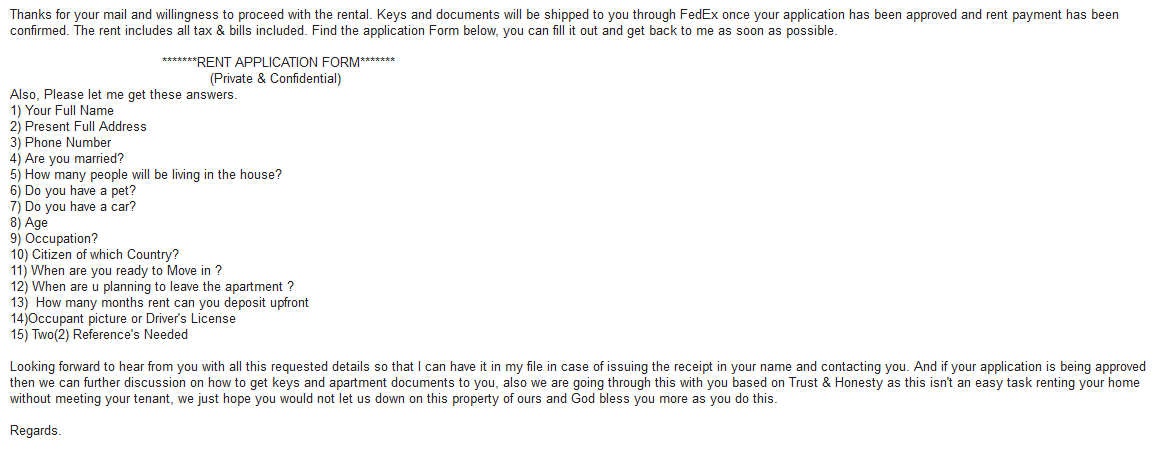The Ugly Truth About Craigslist Rental Scams
At its best, it’s the premiere classified site and message board, and at its worst, it’s a breeding ground for Craigslist rental scams.
Craigslist has revolutionized the classified section since first appearing in 1995. Started by an actual gentleman named Craig Newmark, the site has had its share of hits and misses.
Craigslist’s Origins
The pilot version of Craigslist began in the San Francisco Bay area, as an email distribution list amongst friends. It was successful enough that it expanded into a web-based service in 1996. Craigslist undertook the project of including other cities in the year 2000 and was translated into five different languages beginning March 2008. Initially, Newmark was as surprised as anyone by the fervent success of the site and the trend of new users interested via word of mouth.
What began as a list about social events for software and developers, has transformed into a website which has a community (functions, classes, childcare, volunteers), personals, housing, for sale, services, jobs, gigs, resumes, and even discussion forums which run a gamut of interests.
Why Are There so Many Craigslist Rental Scams?
One of the most popular destinations for users of Craigslist is the housing section, which exists in each city and country where Craigslist has created a section. Housing sections feature the categories of apartments/housing, housing swap, house wanted, office/commercial, parking/storage, real estate for sale, rooms/shared, rooms wanted, sublets/temporary, and vacation rentals.
Used by real estate agents, renters, homeowners, roommates, and more, it is a premier destination for finding local housing or even business rentals. What started as an excellent way for individual users to connect with private parties leasing their home or business, has now morphed into a hotbed for scams.
The best way to recognize Craigslist housing scams are, as follows:
1. The Listing Has No Photos
While this isn’t always indicative of a scam, these days most everyone has a smartphone with a camera to snap a few photos of their leased home, business, room, or unit. If an advertisement for rental has NO images, beware.
Make sure to utilize Craigslist’s new anonymous email reply feature (which encodes your actual email address for your initial emails) and ask the user to add photos to their posting. Beware of photo files sent to you, that you have to download to open.
2. They Want Your Personal Information
You see a beautiful rental listing and reply to the post, hoping to be one of the first people to view it in person. Surprisingly, the original poster writes back needing various personal information about you ranging from your driver’s license, social security number, a credit card, or even your bank information. The moment someone asks you for personal information of this kind, you can rest assured that it is almost guaranteed that the listing you sought is a scam and the person on the other end of the ad merely wanting to steal your money and identity.
3. The Email Address or Domain Looks Fishy
While there are many real, but unusual sounding screen names or email addresses that are legit, if someone is writing you from an uncommon @————.com, then it is highly possible they are phishing or a scammer/thief.
4. Beautiful Home or Unit, for Pennies on the Dollar
Everyone would love to find a great deal on a local home or rental, but when a particularly attractive or sought after home or area is listed for hundreds (or thousands) less than the going rate, you can be all but guaranteed the posting are Craigslist apartment scams and only there to trick eager leasers.
What I recommend that you do is to run a reverse image search of the rental photos to check where the images have been stolen from:

5. No Security Deposit, a Month Free, etc.
If the advertisement sounds like a carrot being dangled, then it is more likely to be a scam. Most modern owners with decently rentable properties don’t want to give away their earnings for free. While including free cable or water paid is regular, a suspiciously large offer of something “free” should be met with more scrutiny.
6. Credit Check Before Seeing the Property
As with #2, giving information out in advance is a bad idea. Authorizing credit checks without signing forms, seeing a property, or verifying the integrity of the property owners is a dangerous road to being scammed.
7. Owner Is out of Town
They have photos of a property you are sure you want to rent, for a high price. The original poster gives you the address, and you drive by the property to look at it, where you see a “for lease” sign in the front yard. So far, everything seems to check out.
However, a popular Craigslist rental scam is to post photos and the address of an actual rental property, which the poster doesn’t actually own, then attempt to have prospective renter wire transfer or authorize payment for the lease or deposit, by claiming they can rent it but it isn’t available to show right now. This is often excused by saying the “owner” is out of town. The person(s) interested in leasing are so desperate to lease property of that caliber, which they agree to send or authorize funds.
8. You Are Shown the Home/Rental, but the Person Showing It to You Doesn’t Actually Own It
In cases like this, the person you’ve met with has broken into the home, cracked the lock box code, or stolen a key in some way. They may know that the owner is out of town or meet with you long enough to get funds via a fake lease or deposit.
This can be a disaster for a hopeful renter and the actual home or rental owners as well. City records can sometimes help verify the real owners or reach out to a respected realtor to act as middle-man/woman.
If You Find out You Have Been or Suspect You Might Be the Victim of a Housing Scam:
- Flag the posting.
- If funds have been exchanged or you feel others may have been or are about to be scammed, file a police report by consulting local law enforcement.
- File a report with the Federal Trade Commission (FTC), here.
Craigslist is a usable way to find rentals, but as with all modern day internet interactions, knowing what to look for and how to be safe is imperative with Berify’s reverse image search:












